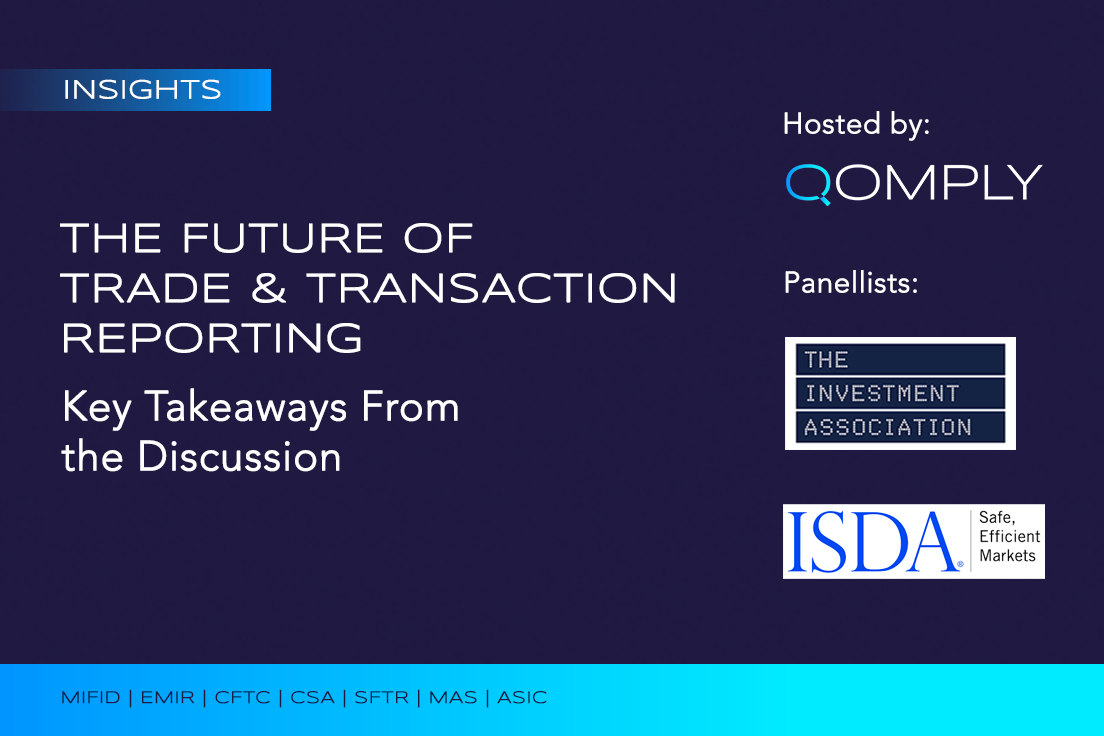The Future of Trade & Transaction Reporting
Key Takeaways from the Panel Discussion
 Updated By: Sophia Fulugunya
Updated By: Sophia Fulugunya
Director of Transaction Reporting
Published: 6 October 2025
The Future of Trade & Transaction Reporting
Qomply recently hosted an engaging panel discussion on the future of trade and transaction reporting, bringing together leading industry experts. The session, chaired by Sophia Fulugunya, Director of Transaction Reporting at Qomply, featured panellists:
- Chris Akuwudike (Former FCA regulator)
- Andrew Bayley (ISDA)
- Jermaine Nooks (Investment Association)
Regulators' Expanding Use of Data
The discussion began with how regulators are shifting in their use of transaction data. Historically, this data was leveraged primarily to detect and investigate market abuse. Today, however, regulators are adopting a more strategic and supervisory approach.
Panellists highlighted that regulators are increasingly analysing transaction data to monitor systemic risk, liquidity patterns, and overall market behaviours. It is no longer just about identifying misconduct; it is about gaining a holistic view of market functioning.
From a firm’s perspective, this shift has significant consequences: regulators are no longer simply asking, “Is your data complete?” Instead, they are asking, “What does this data reveal about your business?”
The consensus was clear: as regulators become more sophisticated in their use of data, firms must strengthen governance, take ownership of data quality, and close the gaps between compliance, operations, and the front office.
Horizon Scanning: Divergence and Reform
The panel then turned to future regulatory developments, focusing on ESMA's call for evidence and the FCA's DP24/2 consultation.
It was observed that ESMA is moving toward greater granularity and clarity in reporting requirements, while the FCA is taking a more strategic, data-led approach that could result in a distinctly UK regulatory path.
Panellists highlighted the practical impact of divergence, noting that even minor changes - such as a field name or reporting threshold - create significant operational challenges. Firms are increasingly treating UK and EU MiFIR as separate regimes. While this may bring operational clarity, it also places a heavier burden on smaller firms.
The discussion recognised divergence as a reality that firms cannot ignore. However, it also presents an opportunity for industry participants and regulators to collaborate on common standards, helping to reduce unnecessary complexity while respecting local priorities.
Technology: From Tactical Patch to Strategic Enabler
The third theme focused on the growing role of RegTech. Rising reporting volumes, diverging rulesets, and complex validations are driving firms to adopt technology solutions at scale.
The panel emphasised that technology is no longer viewed as a cost-saving measure alone. It is increasingly being used for real-time validations, exception monitoring, and root-cause analysis of errors.
There was agreement that technology is now a strategic necessity. However, its effectiveness depends on robust governance, regulatory understanding, and seamless integration across the reporting chain.
Enforcement Actions: Lessons for the Industry
The panel also examined the sharp rise in enforcement activity under MiFIR. In the UK for seven years, there were no public enforcement outcomes, and then, within a single year, two significant fines were issued:
- A £99,200 fine for failing to report CFD trades over a six-month period.
- A £1,087,300 fine for a broking firm with errors in over 95% of its transaction reports.
Both cases highlighted the importance of strong governance and effective controls. These were not minor technical errors, but indicators of systemic weaknesses in oversight.
When asked what firms can do to avoid similar outcomes, the panellists provided practical advice:
- Raise awareness: Use high-profile fines to bring transaction reporting to the attention of senior management.
- Expect deeper scrutiny: Be prepared for broader investigations, such as s166 reviews, which often follow poor reporting.
- Use resources wisely: Leverage both internal and external expertise to close gaps, reduce blind spots, and enhance assurance.
The message was clear: enforcement is no longer theoretical. Firms must treat transaction reporting as a priority risk area, backed by strong governance, monitoring, and cultural awareness at the senior level.
Key Takeaways
The panel concluded with four overarching insights for firms:
- Regulators are becoming smarter, more proactive users of data. Reporting should be treated as a supervisory tool, not simply a compliance task.
- Divergence is here to stay. Firms need to balance agility with consistency and engage with regulators and industry bodies to help shape outcomes.
- Technology is essential but not a silver bullet. RegTech should be a strategic enabler, underpinned by governance and ownership.
- Enforcement is real and increasing. Firms should learn from recent fines and strengthen governance to avoid consequences.
Closing Thoughts
The panel was a resounding success, offering valuable insights from across the industry. Qomply extends its thanks to our panellists and attendees for contributing to such a dynamic discussion.
As the regulatory landscape continues to shift, Qomply remains committed to supporting firms in enhancing data quality and making compliance a source of confidence rather than concern.
If you would like to discuss any of these themes further or learn more about Qomply’s solutions, please contact our team.

